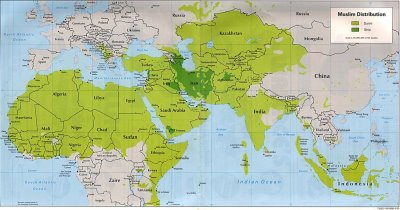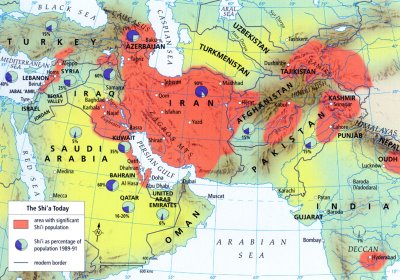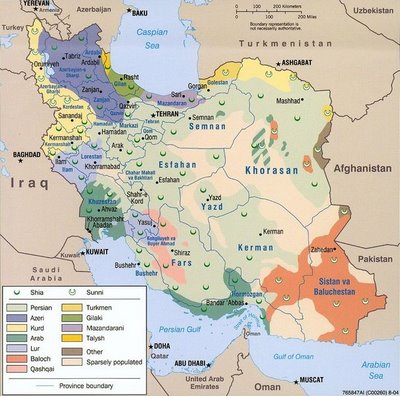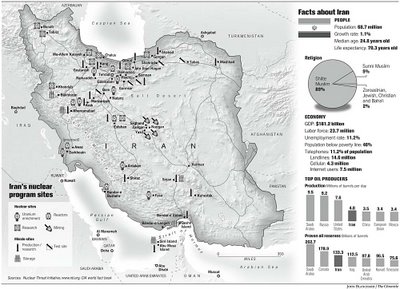The Challenge of Iran and the Defeat of Terrorism - Part I
This is Part I of a two part series. Part II is just below.
It should be obvious to any thinking person that we in the west are engaged in a life-or-death struggle with the dark side of Islam. From the turmoil we are seeing in Iraq and Afghanistan, from the obvious support that so-called, peaceful Muslims in the Middle East give to the terrorists, and from the clear indications that in large portions of Europe, they have already won, it’s also clear that we are in for a long and difficult struggle for the survival of our way of life and of our civilization. I say that Europe is already close to lost because we see cave-ins to Muslim demands on a daily basis in France, Germany, Belgium, Spain, the Netherlands, and even Great Britain.
Although the Saudis and the Emirates have financed terrorism outside of their countries, the Emirates have clearly reversed course, and the Saudis seem to have recognized that their actions have blown up in their faces, both literally and figuratively. Iran and Syria have become the focal point. They are now the main supporters and instigators of terrorism in the Middle East, but since the decline of the Soviet Union, Syria is largely dependent on Iran, and if Iran withdraws, so must Syria. Iran has become the key.
Let’s first examine the Islamic world that we confront – a world consisting of approximately 1.6 billion people of Muslim faith. (Yellow areas have large populations, but not a majority of Muslims.)
LEFT CLICK ON ANY MAP TO ENLARGE
According to most sources, including the US Library of Congress, present estimates indicate that approximately 85-90% of the world's Muslims are Sunni and approximately 10-15% are Shi'a. Today there are roughly 216 million Shi'as (including Twelvers, Ismailis, Zaydis and Alawis) all over the world, and around three quarters of those reside in Iran, Pakistan, Iraq, Afghanistan and India.
A large portion of the world's Shi'a live in the Middle East. They constitute a majority in Iran, Iraq, Bahrain,Oman and Azerbaijan. They remain as significant minorities in Afghanistan, Syria, Pakistan, Turkey and Yemen. In Lebanon Shi'as form a plurality (the largest of groups, with none forming a majority). Among smaller Persian Gulf states, Qatar, Kuwait and the United Arab Emirates have significant Shi'a minorities, as do the Eastern Province of Saudi Arabia.

I’m not knowledgeable enough about the Muslim religion and its divisions to approach matters from a religious standpoint, but it is clear from recent events that the Shi'as and the Sunnis have no great love for one another. The events I am referring to include the sectarian violence in Iraq, where Al Qaeda terrorists have been basically routed, but Sunnis and Shi'as have taken up killing each other, and the reactions of certain Sunni states (like Saudi Arabia and Egypt) to the (Shi'a) Iran-supported Hezbollah in the recent conflict in Lebanon. Although the Shi'as are a small minority within the entire Muslim world, they constitute a large portion of the Muslims who live within the Middle East. If all else seems to be failing, this might provide an opportunity to direct the death culture of the Islamic fundamentalists inward, rather than towards the infidels (us), and it might provide an approach to solving the grave threat presented by the prospect of Iran gaining nuclear weapons.
I think everyone and anyone thinking rationally about Iran and its (seemingly) crazy leader, Ahmadinejad, shudders to think of the possibility of a nuclear armed Iran, and would conclude that this must not be allowed to happen. The problem is, Iran, with its heterogeneous culture and its widely dispersed nuclear program presents a very difficult problem. Taking out a single reactor as the Israelis did in Iraq is not an option. There are also many signs that large segments of the Iranian population do not want nuclear weapons development there, and there is a reasonable potential for regime and policy change there. Here below is a pretty good picture of the complexity of the Iranian population and the dispersal of its nuclear program.

Opinion Journal
"Iran's nuclear program raises the stakes of its deceit to U.S. national security. There is little doubt that Tehran's nuclear program is not peaceful. On Feb. 14, 2005, Ayatollah Mohammad Baqer Kharrazi, secretary-general of Iranian Hezbollah, promised, "We are able to produce atomic bombs and we will do that." In February 2006, Mohsen Gharavian, a Qom theologian well-connected to the Islamic Republic's staunchest ideologues, called Iran's possession of nuclear weapons "natural."
Iran's nuclear program has advanced through the trust of diplomats and their willingness to provide hard currency in the name of dialogue and engagement. Between 2000 and 2005, European Union trade with Iran almost tripled. Tehran invested much of this money in arms and nuclear infrastructure. For more than a decade, through both the Rafsanjani and Khatami administrations, Iranian authorities hid the existence of a uranium enrichment plant at Natanz and a heavy water plant at Khondab. That Western diplomats label Mr. Rafsanjani a pragmatist and Mr. Khatami a reformer underscores the danger of judging Iranian officials by style rather than action.
In February 2003, the Iranian authorities opened the secret plants to International Atomic Energy Agency (IAEA) inspectors. Their subsequent report was damning: Not only had the Iranian government designed the Natanz facility to house at least 50,000 centrifuges, but Tehran had the import of almost a ton of uranium from China, and could not account for missing processed uranium. During subsequent inspections, Iranian authorities repeatedly changed their stories when asked about the origin of weapons-grade uranium traces. Subsequent inspections exposed other lies. Finally, on Sept. 24, 2004, the IAEA Board of Governors, after recalling a litany of Iranian mistruths, found Iran in breach of its Non-Proliferation Treaty Safeguards Agreement. While Iranian officials have made many subsequent pledges to cooperate, their actions belie their words. They have yet to abide by the Additional Protocol's inspection standards and, earlier this year, turned away IAEA inspectors from Natanz in violation of the NPT."
Mr. Rubin, a resident scholar at the American Enterprise Institute, is co-author, with Patrick Clawson, of Eternal Iran: Continuity and Chaos (Palgrave, 2005).
American Spectator
"It seems to me that the Islamofascists of Hezbollah have made a parlous mistake. They have demonstrated that they have missiles that can cause dreadful localized carnage and that they are continuing to improve those missiles. Someday these weapons will be able to cause widespread carnage. Hezbollah's killers have demonstrated that they will infiltrate their brutes into civilian neighborhoods and use suicide bombers. They have refused to abide by United Nations resolutions. They have revealed that they have powerful supporters in Syria and Iran. Actually the Syrians and Iranians have not been coy about showing their support for Hezbollah's brutal asymmetrical warfare, and here they too have made a mistake. In their unconscionable bellicosity Hezbollah's guerrillas, the Syrians, and the Iranians have all donned bull's-eyes. They have made themselves targets." R. Emmett Tyrrell
RealClearPolitics.com
"Iran is one of the most surprising and confounding countries I've visited. It's more modern than one expects, more open, more diverse. You hear conflicting opinions on almost every topic -- from different factions within the government, the clergy, the media, the business community. This isn't North Korea, or even China -- where a ruling party enforces consensus. At the center of the Iranian government is a black hole, a group of senior clerics whose decisions are wrapped in mystery. That's the essence of the problem -- there are so many competing factions, and so many checks built into the system, that sometimes nobody seems to be steering the ship of state.
Which is the real voice of the country -- the fulminating rhetoric of President Mahmoud Ahmadinejad or the measured tones of Iranian parliament member Kazem Jalali, who insists in an interview that Iran is ready for negotiation with the West? Is it the gravelly sermon of Ayatollah Ahmad Jannati, who leads the crowd of worshippers in chants of "death to America'' at Friday prayers at Tehran University? Or is it the learned discourse of Grand Ayatollah Yusef Saanei, who tells me in his seminary at Qom that he favors dialogue with the West and that in today's Iran, "there is talk of human rights everywhere you go.'' David Ignatius
President Bush is being criticized for 'not doing something to stop North Korea and Iran from getting nuclear weapons'. If you are paying attention, North Korea acquired nuclear weapons by bamboozling the Clinton Administration with Jimmy Carter enabling the hoodwinking; also, we have a heavily armed fleet in the waters off Korea watching developments there very closely.
As for Iran, the situation is a hundred times more complex than with North Korea, as I have tried to lay out here. See Part II (my next post) for a further discussion.



1 Comments:
Outstanding Blog Post. Iran is the key.
Post a Comment
<< Home